- Home
- Roy J. Snell
Sparky Ames of the Ferry Command Page 2
Sparky Ames of the Ferry Command Read online
Page 2
CHAPTER I
THE FLIGHT OF THE LONE STAR
The air above the Brazilian jungles along the dark waters of the RioBranco in northern Brazil was full of sound. The roar and thunder ofmany motors beat down upon the sea of waving treetops until it seemedto stir them into animated life. A formation of great, four-motoredplanes was passing over.
Two natives in a small dugout on the river dropped their paddles intotheir wooden canoe, then sat staring upward. The river’s current sweptthem beneath the branches of a dead mango tree. One of them reached upto snap off a brittle branch.
Breaking pieces from this branch he placed them, one by one, in thebottom of the canoe. When there were thirty-eight pieces, he stopped tosit as if in a trance watching those great, man-made birds go sweepingon.
Presently his companion grunted, then pointed at the sky upstream. Thefirst native again looked skyward, then placed two more sticks with theothers, making forty in all. Then he drawled a few native words that inour language mean:
“One of these big birds is very sick.”
This native was old. He had lived long beneath the overhangingtreetops. He knew the ways of birds and men, but not of airplanes. Forall that, he was right. One of these flying things of metal was sick,very sick.
Even as he said the words, there came a sudden burst of thunder, andthe larger of the two planes, the one that was not “sick,” a ship sowell formed—sleek and beautiful—that a native’s eyes shone at sightof it, pulled away from its slow, sick companion and went speedingalong over the forest that lined the downsweep of the river.
“Gone,” said the native. “Now this one will die.” His eyes shone with anew light. Once on the Rio Negro, he had seen one of these man-madebirds. There had been much on that plane that he had coveted. And now—
These last two planes were not bombers, but transport planes. It wasquite evident that the speeding plane had not deserted its companion,for, in a short time, it came roaring back and a girl’s voice speakinginto a radio said:
“There’s a rather large clearing about fifty miles down. Think you canmake it?”
“We’ll have to try,” came in a man’s strong, even tone. “We’re on onemotor now. The other is cutting out on me. Can’t tell how soon it willquit dead.”
“We’ll tag along,” came in the girl’s voice. “If you make it—”
“If we get that far, we’ll try a landing,” was the answer.
“And if anything goes wrong—”
“You’ll fly right on.” The man’s voice was harsh, insistent. “Remember!Secret—”
“Don’t say it, Sparky!” The girl’s voice rose sharp as an alarmedbird’s. “Don’t say it!”
“All right! All right!” the man’s voice grumbled into the tropical air.“Then I won’t say it. All the same—”
“All the same, if you go down there we’re coming right down after you,”the girl insisted. “You know what our orders were, to fly in pairs. Ifone plane is disabled, its mate must go to the rescue. All other planesmust go straight on. We’re on a mission of destruction. That’s all weknow. It’s urgent. We must go through!”
“Okay, sister, that’s why you should fly right on.”
“But we won’t.” The girl spoke quietly. “If you crack up, we’ll beright down. This ship has control. I can land her on a dime.”
“But don’t forget—”
“I never forget,” the girl snapped. “Now go on down there and try yourluck. It’s all that’s left to do.”
“What’d he mean—secret?” The blonde-haired girl who sat in theco-pilot seat beside the girl who had carried on that spiritedconversation, drawled, “What secret?”
“Sorry, Janet,” was the slow reply. “You’ve heard of military secrets,I suppose?”
“For Pete’s sake, Mary Mason! Yes! Of course, I have, but I don’t see—”
“This is one of them.” Mary Mason, the little girl who piloted a bigplane, favored her with a smile.
After that, save for the slow drone of motors, there was quiet in thecabin, a tense sort of calm, such as comes before a storm. After a timethe blonde-haired Janet said:
“Sparky’s motors didn’t stop all by themselves.”
“Of course they didn’t. Sparky’s too good a pilot for that.”
“He sure is. It’s the work of the enemy. That’s what it is. He knows.He’s after us, after you and Sparky, Don and me. He’s got us comingdown in a jungle and we’re only just out of good, old U.S.A. And thinkof the dizzy miles still ahead of us! And the enemy dogging our luckall the way!”
“I thought of him before I started,” Mary replied quietly. “Let him dohis worst. We’ll win, you’ll see!”
For the swift, powerful twin-motored transport plane flown by MaryMason, the distance to that native clearing on the Rio Branco was justa jump, but she did not jump. Instead she followed doggedly on behindher limping companion. And as she followed, she found time to think.Those were long, long thoughts.
She was a member of the WAFS, Women’s Auxiliary Ferrying Squadron, thisslender girl with the flashing black eyes and trigger-quick fingers.For six wintry months she had flown planes from east to west, fromnorth to south, and all the way back again. Sometimes these planes weretransport planes or bombers with comfortable, heated cabins. More oftenthey were open-seated trainers or fighters. She flew them in wind,rain, and snow. Mile after weary mile in lonely solitude she had goneroaring through the night sky to arrive at last at her destination onlyto be ushered aboard an airways plane and hurried back again.
“It was hard,” she said to Janet Janes, her companion.
“Sure it was,” the other girl agreed. “Looks as if this would beharder.”
“Perhaps,” Mary answered. “But just think! In the past two days it’sbeen San Francisco to Denver, to Chicago, to Miami!”
“To Caracas, and then to the heart of a jungle where headhunters beaton hollow logs inviting their friends to a feast.” Janet laughed inspite of herself.
“This will be just a pause,” Mary insisted stoutly. “After that it willbe Para, to Dakar in Africa, Dakar to Egypt and the pyramids, Egypt toPersia—”
“Under the Persian moon,” Janet sang softly.
And then:
“Watch!” Mary exclaimed. “There’s the clearing. Sparky has spotted it.He’s preparing to circle. He’s going down!”
Suddenly Mary set her motors thundering. After climbing steeply sheleveled off to stare down at the clearing.
“He didn’t go down, not yet,” Janet informed her.
“No. There are people running from that row of native huts. He’d hitthem.”
“They’re like ants coming from an ant hill. They don’t seem important.”
“Oh! But they are!” Mary exclaimed. “Every human life is important.Besides, if Sparky killed just one of them, our lives wouldn’t be wortha penny. We’re in the wilds.”
“Probably not a white man within a hundred miles.”
“Or perhaps a thousand.”
“I wish we might go on.” A suggestion of strain crept into Janet’svoice.
“Oh! But we can’t.” Mary’s plane was circling slowly now.
“Of course we couldn’t go on,” she told herself. “Not even if Sparkyinsisted.”
Through her racing mind whirled memories of other days, those bad daysof winter convoy in America. There had been only twenty-five of them,twenty-five WAFS, and so much work to do. Always, on her return from along, hard trip, muddy, chilled through and half-starved, if he chancedto be in, she had found Sparky waiting in his car to whisk her away toher barracks and after that to a glorious hot meal. “Thick, juicysteaks, French fries, lemon pie, and barrels of hot coffee,” shewhispered.
And now Sparky was down there below her in his disabled plane waiting,waiting for the last darting spot to glide from those huts into thebush that lay beyond. No, they could not go on. “Not even for thesecret—” she sp
oke aloud, then checked herself just in time.
“He can’t climb,” she said to Janet. “He can only circle. And if hisother motor quits he may go crashing straight down!”
“There!” Janet breathed. “Now there’s no one!”
“Yes, just one more.”
A very small black spot, moving, oh, so slowly, went weaving this way,then that, toward the forest.
“A child!” Mary exclaimed. “How Sparky would hate hitting a child!”
“Now!” Janet breathed.
“No,” Mary groaned. “One more, a smaller one.”
It seemed an eternity before this last child had reached safety.
Of a sudden the plane beneath them lunged downward.
“There they go!” Janet gasped while Mary’s clutching fingers fairly bitinto the stick.
But no, Sparky’s plane seemed to shudder. No doubt his motor had quit,then gone on again.
“Why doesn’t he go down?” Mary groaned. “Here, take the plane!” Shegave Janet her place. “Just circle slowly.”
With long, swift strides she reached the plane’s door. There she bracedherself, then stood watching the plane below.
“He’s going down,” she whispered.
It was true. Circling slowly, cautiously, Sparky nursed his disabledplane at last into a smooth glide that brought him swiftly down.
“He’s out too far,” she groaned. “He’s afraid there’s just one morenative child.
“There!” she exclaimed. “He’s down!”
She saw the big plane bump hard, then bump—bump again. It did not heelover, but went gliding straight on.
“He made it!” she screamed aloud. “Oh! Glory!”
Bright hopes sped through her mind. The defective motors would soon berepaired. Before the natives returned they would once again rise highabove the jungle and speed away to rejoin their convoy. She had begunto feel dreadfully lonesome away from all that thundering flight. AtPara, they would be united and then—
Her thoughts broke off. Her lips parted in a scream that did not come.Of a sudden the ship down there on the ground, gliding forward, hadwhirled half about. Its right wing crumpled; it turned toward the blackwaters of the river. After gliding forward half the distance to thosethreatening waters, it came to a sudden halt, then crumpled into a heap.
With lips parted she kept her eyes glued upon the plane. Would it beset on fire? A slow smoke rose, but no flames.
A figure came tumbling from the plane. “One more!” she whispered. “Justone more!”
The figure that had appeared remained motionless for a space ofseconds. Then he leaped forward to re-enter the wreck.
“One of them is hurt,” she called to Janet. “Keep circling.”
It was true, for soon the single figure appeared once more, this timebearing a limp burden.
“Janet,” Mary exclaimed as she resumed control of the plane, “we’regoing down!”
“This,” said Janet, “is a large plane. Larger than Sparky’s.”
“And easier to control. This,” said Mary proudly, “is the Lone Star,the only plane of its kind in the world!”
“It’s almost priceless,” Janet agreed.
“Yes, and its cargo is really priceless,” Mary might have added, butdid not for that was her military secret, hers and Sparky’s. The C.O.had told just that to her before they took off.
“I am putting it on your plane,” the C.O. had said, “because your LoneStar is the fastest, strongest, most dependable transport plane we havein our outfit. And I have given the plane to you because other than twopilots that cannot be spared, you are the only one who knows her andcan take her safely through.”
This, she realized, had been high praise. Hers was a graveresponsibility, but Sparky, her good pal, was down there. Was he theone who had been injured? She had no way of knowing.
“I’m going down,” she repeated softly.
------------------------------------------------------------------------

 On the Yukon Trail
On the Yukon Trail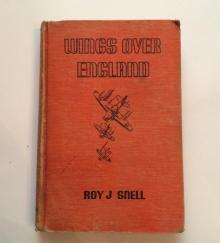 Wings over England
Wings over England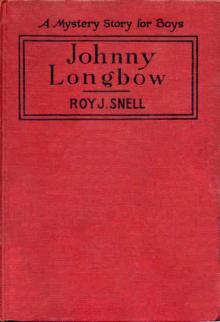 Johnny Longbow
Johnny Longbow Sally Scott of the WAVES
Sally Scott of the WAVES The Secret Mark
The Secret Mark Betty Leicester's Christmas
Betty Leicester's Christmas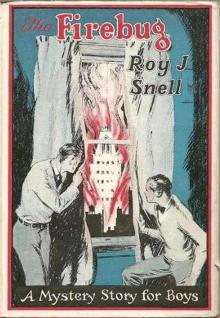 The Firebug
The Firebug Minnie Brown; or, The Gentle Girl
Minnie Brown; or, The Gentle Girl Jack the Hunchback: A Story of Adventure on the Coast of Maine
Jack the Hunchback: A Story of Adventure on the Coast of Maine The Silent Alarm
The Silent Alarm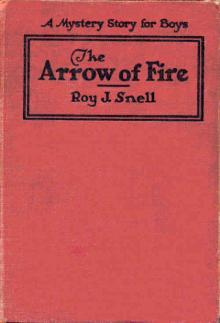 The Arrow of Fire
The Arrow of Fire The Magic Curtain
The Magic Curtain The Crystal Ball
The Crystal Ball The Secret of Casa Grande
The Secret of Casa Grande Gypsy Flight
Gypsy Flight The Mystery of Carlitos
The Mystery of Carlitos The Meadow-Brook Girls on the Tennis Courts; Or, Winning Out in the Big Tournament
The Meadow-Brook Girls on the Tennis Courts; Or, Winning Out in the Big Tournament Witches Cove
Witches Cove Riddle of the Storm
Riddle of the Storm Forbidden Cargoes
Forbidden Cargoes Green Eyes
Green Eyes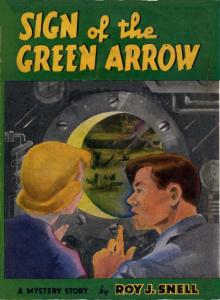 Sign of the Green Arrow
Sign of the Green Arrow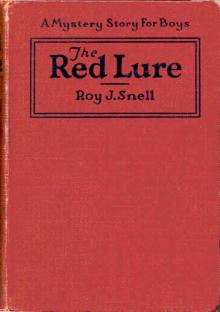 The Red Lure
The Red Lure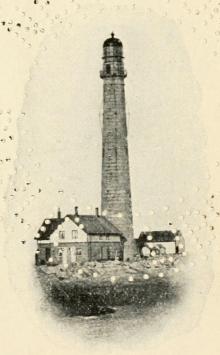 The Light Keepers: A Story of the United States Light-house Service
The Light Keepers: A Story of the United States Light-house Service A Ticket to Adventure
A Ticket to Adventure Helen in the Editor's Chair
Helen in the Editor's Chair Blue Envelope
Blue Envelope The Purple Flame
The Purple Flame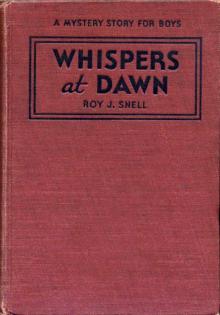 Whispers at Dawn; Or, The Eye
Whispers at Dawn; Or, The Eye The Rope of Gold
The Rope of Gold Crossed Trails in Mexico
Crossed Trails in Mexico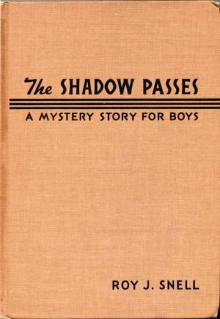 The Shadow Passes
The Shadow Passes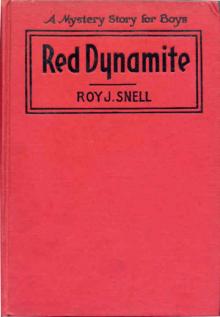 Red Dynamite
Red Dynamite Blue Grass Seminary Girls on the Water
Blue Grass Seminary Girls on the Water The Cruise of the O Moo
The Cruise of the O Moo